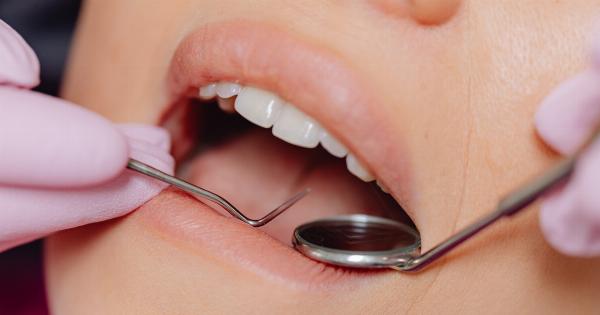A cracked tooth is a common dental problem faced by many individuals. A tooth can crack due to various reasons, such as biting a hard object, grinding teeth, or due to an injury. A fractured tooth can cause pain, sensitivity, and discomfort.
However, many individuals do not realize the risks associated with a cracked tooth. In this article, we will discuss the risks associated with a cracked tooth and what you should do in case your tooth is cracked.
What are the Risks of a Cracked Tooth?
A crack in a tooth may seem like a minor problem but it can lead to several serious consequences in the long run. Here are some risks associated with a cracked tooth:.
1. Tooth Decay
Cracks in teeth can cause bacteria to build up leading to tooth decay. When bacteria get into the crack, it can cause an infection which can spread to the tooth root leading to a more severe dental problem.
2. Gum Disease
Bacteria in the crack can also cause gum disease. Gum disease is a severe dental problem that can lead to bone loss and tooth loss. It can also cause bad breath and bleeding gums.
If left untreated, gum disease can also lead to several systemic diseases such as heart disease and diabetes.
3. Tooth Sensitivity
A cracked tooth can cause sensitivity when eating or drinking hot or cold liquids. The sensitivity can be mild or severe, making it difficult to eat or drink anything without pain or discomfort.
Tooth sensitivity can also lead to further dental problems if left untreated.
4. Tooth Loss
If a cracked tooth is left untreated, it can lead to tooth loss. The crack can cause infection and decay leading to the need for a tooth extraction.
Tooth loss can lead to further dental problems such as shifting teeth, bone loss, and problems with chewing food.
What Should You Do in Case of a Cracked Tooth?
If you suspect that you have a cracked tooth, you should visit a dentist immediately. Early intervention can prevent further damage and the need for more complicated and expensive treatments. Here are some things you should do:.
1. Avoid Eating Hard Foods
If you suspect that you have a cracked tooth, avoid eating hard foods that can cause further damage to your tooth. These include nuts, hard candies, and ice cubes. Also, avoid biting your nails or using your teeth to open bottles or packaging.
2. Rinse Your Mouth with Warm Salt Water
Rinsing your mouth with warm salt water can help reduce pain and swelling associated with a cracked tooth. The saltwater can also help kill bacteria that can cause infection.
3. Use Painkillers
You can take over-the-counter painkillers such as ibuprofen or acetaminophen to help relieve pain associated with a cracked tooth. However, it is important to consult with a dentist before taking any medication.
4. Visit a Dentist Immediately
In case of a cracked tooth, you should visit a dentist immediately. The dentist will examine the tooth and determine the extent of the damage. Based on the severity of the crack, the dentist will recommend the best treatment options available.
What are the Treatment Options for a Cracked Tooth?
The treatment for a cracked tooth depends on the severity of the crack. Here are some treatment options:.
1. Dental Bonding
Dental bonding is a common treatment for minor cracks in teeth. The dentist will apply a tooth-colored composite resin to the affected tooth, which will blend in with the natural color of the tooth.
The bonding material is then hardened, shaped, and polished to give a natural look to the tooth.
2. Dental Crowns
Dental crowns are used for severe cracks in teeth. The crown is a small cap that is placed over the damaged tooth. The crown is made of materials such as porcelain or metal, which will provide long-lasting protection for the tooth.
The crown will also prevent bacteria and other debris from entering the tooth.
3. Root Canal Treatment
If the crack is deep and extends to the pulp of the tooth, root canal treatment may be required. During this treatment, the dentist will remove the damaged pulp, clean the inside of the tooth, and seal it with a filling.
A crown is then placed on the tooth to protect it from further damage.
4. Tooth Extraction
In rare cases, if the crack is severe and the tooth is beyond repair, the dentist may recommend tooth extraction.
The tooth will be removed, and a dental implant or bridge will be placed in its position to restore functionality and aesthetics to the mouth.
Conclusion
A cracked tooth may seem like a minor dental problem, but it can lead to several complications if left untreated. Tooth decay, gum disease, tooth sensitivity, and tooth loss are some of the risks associated with a cracked tooth.
Early intervention and treatment can prevent further damage and the need for more complicated and expensive treatments. Therefore, if you suspect that you have a cracked tooth, visit a dentist immediately.




























